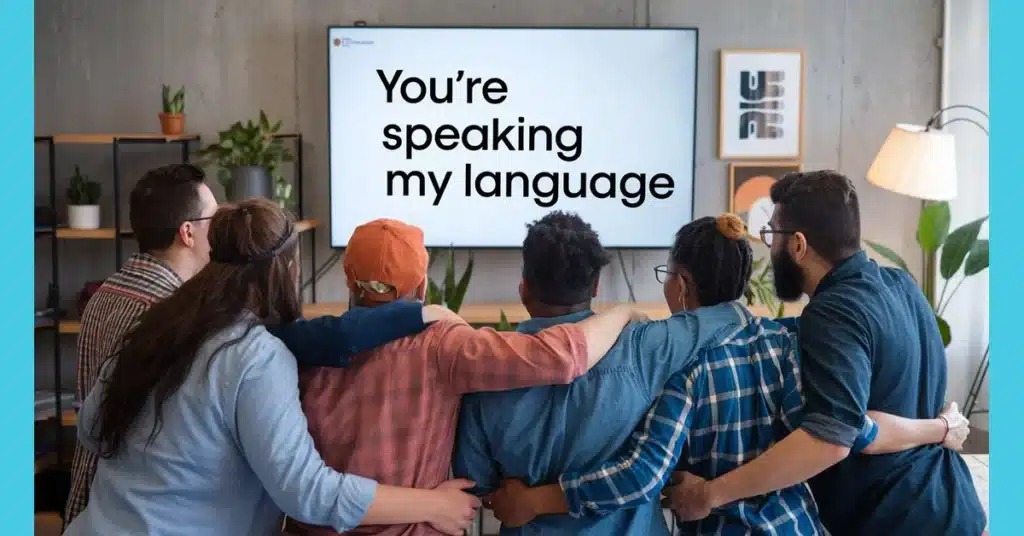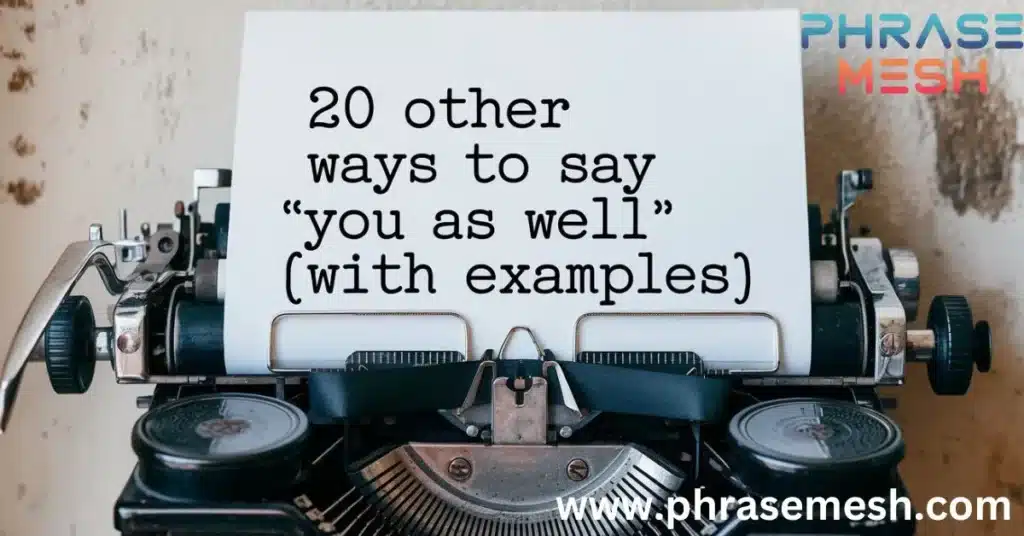Ever caught yourself using “you as well” too often in your conversations or emails? Let’s dive into some fresh substitutes that’ll add personality to your responses. Whether you’re writing professionally or casually, these alternatives to the common phrase “you as well” will help you sound more natural and engaged.
Is It Correct to Say “You As Well”?
“You as well” is generally grammatically correct and widely accepted in both formal and informal communication. While some consider it slightly more formal than “you too,” it’s perfectly fine to use in most contexts. The phrase works as a polite response to express reciprocity or return a sentiment.
However, in formal writing or professional settings, you might want to use complete sentences or more specific responses. For instance, instead of just saying “you as well” in response to “have a great day,” you could say “I hope you have a great day as well.”
What to Say Instead of “You As Well”
- Right back at you
- Likewise
- Same to you
- The feeling is mutual
- And you too
- Ditto
- The same goes for you
- Back at you
- I feel the same way
- You too!
- Couldn’t agree more
- That makes two of us
- I second that
- My thoughts exactly
- You’re speaking my language
- We’re on the same page
- You took the words right out of my mouth
- That’s just what
- I was thinking
- You read my mind
- Great minds think alike
1. “Right back at you”

This casual yet warm alternative phrase works great in friendly conversations. It’s like tossing a compliment right back to someone with a smile.
Example Scenario: Text message exchange: Sarah: “You’re such a great friend!” Mike: “Right back at you! You’ve always been there when I needed someone.”
2. “Likewise”
One of the most elegant substitutes for “you as well”, “likewise” carries a touch of sophistication while staying friendly.
Example Scenario: After a business meeting: Client: “It was a pleasure meeting you today.” Consultant: “Likewise! I look forward to our collaboration.”
3. “Same to you”
This casual variation of “you as well” feels natural in everyday conversations. It’s simple, direct, and warm.
Example Scenario: Email exchange: Maria: “Have a fantastic weekend!” James: “Same to you! Hope you get some well-deserved rest.”
4. “The feeling is mutual”
When you need something more expressive than basic alternatives to repetitive phrases, this option adds emotional depth to your response.
Example Scenario: Professional networking event: Alex: “I’ve really enjoyed our conversation about industry trends.” Taylor: “The feeling is mutual! Your insights about digital transformation were eye-opening.”
5. “And you too”

Among the various options instead of “you as well”, this one maintains warmth while adding a personal touch.
Example Scenario: Restaurant setting: Server: “Enjoy your meal!” Customer: “And you too— I mean, have a great day!” (We’ve all been there!)
6. “Ditto”
For casual settings, this fun different way to say “you as well” adds personality to your response.
Example Scenario: Social media comment: Friend: “Missing our coffee chats!” Response: “Ditto! We need to schedule one soon!”
7. “The same goes for you”
This thoughtful phrase stands out among other different phrases for “you as well” by showing genuine reciprocation.
Example Scenario: Performance review: Manager: “It’s been great having you on the team.” Employee: “The same goes for you – your leadership has helped me grow professionally.”
8. “Back at you”
A casual and friendly replacement for “you as well” that works perfectly in informal situations.
Example Scenario: Group chat: Chris: “You guys are awesome!” Lisa: “Back at you! This group makes Mondays bearable 😊”
9. “I feel the same way”
When you need synonyms for “you as well” that convey deeper emotion, this phrase fits perfectly.
Example Scenario: Thank you note response: Dear Rachel, Your kind words about our partnership mean so much. I feel the same way about working with you and your team. Best regards, Michael
10. “You too!”

Sometimes the simplest alternatives are the best. This quick, cheerful response works in almost any casual situation.
Example Scenario: Coffee shop interaction: Barista: “Have a great day!” Customer: “You too! Thanks for the amazing latte!”
11. “Couldn’t Agree More”
This alternative phrase shows enthusiastic agreement while feeling natural and conversational.
Example Scenario: LinkedIn message: Contact: “Your presentation on digital marketing was incredibly insightful!” Speaker: “Couldn’t agree more! The questions from the audience really elevated the discussion.”
12. “That Makes Two of Us”
Among the various substitutes for “you as well”, this phrase adds a touch of camaraderie to your response.
Example Scenario: Work chat: Emma: “I’m really excited about this new project!” Jake: “That makes two of us! Your energy is contagious.”
13. “I Second That”
A dynamic way to express agreement, this different way to say “you as well” works especially well in group settings.
Example Scenario: Team meeting: Project Lead: “We’ve done amazing work this quarter.” Team Member: “I second that! Everyone’s dedication has been incredible.”
14. “My Thoughts Exactly”
When looking for options instead of “you as well”, this phrase shows perfect alignment with the other person’s sentiment.
Example Scenario: Book club discussion: Reader: “This ending really moved me.” Moderator: “My thoughts exactly! The author’s final chapter was masterfully crafted.”
15. “You’re Speaking My Language”

This casual yet expressive variation of “you as well” adds personality to your response.
Example Scenario: Coffee shop conversation: Friend: “Nothing beats a strong espresso on a Monday morning!” Response: “You’re speaking my language! This is exactly what I needed.”
16. “We’re on the Same Page”
Among the different phrases for “you as well”, this one emphasizes mutual understanding.
Example Scenario: Client email: Client: “Quality and timeline are our top priorities for this project.” Contractor: “We’re on the same page! I’ve already drafted a detailed schedule focusing on these key aspects.”
17. “You Took the Words Right Out of My Mouth”
This playful replacement for “you as well” adds charm to casual conversations.
Example Scenario: Restaurant review response: Customer: “The new menu items are absolutely fantastic!” Owner: “You took the words right out of my mouth! Our chef will be thrilled to hear this.”
18. “That’s Just What I Was Thinking”
When searching for alternatives to repetitive phrases, this option feels natural and spontaneous.
Example Scenario: Planning meeting: Colleague: “We should try a more collaborative approach this time.” Manager: “That’s just what I was thinking! Let’s schedule a team brainstorming session.”
19. “You Read My Mind”
This fresh response adds a touch of warmth and connection to your communication.
Example Scenario: Group chat: Friend: “Should we plan a weekend getaway next month?” Response: “You read my mind! I was just about to suggest the same thing.”
20. “Great Minds Think Alike”

A classic among synonyms for “you as well” that never goes out of style.
Example Scenario: Professional conference: Speaker: “I believe AI will revolutionize our industry.” Attendee: “Great minds think alike! I’ve been researching this exact topic.”
Making the Most of These Alternatives
When incorporating these new responses into your communication, consider:
- The formality of the situation
- Your relationship with the other person
- The emotional tone you want to convey
- The cultural context
Pro Tips for Usage
Here are some guidelines for using these alternatives effectively:
- Match the energy of the initial comment
- Consider the communication channel
- Add personal details when appropriate
- Keep your tone authentic
- Use body language to enhance in-person responses
Final Thoughts
Having these additional options instead of “you as well” gives you even more flexibility in your daily communications. Whether you’re in a professional setting or casual conversation, these phrases help you maintain engaging and natural dialogue.
Remember that the best response is one that feels genuine to you and appropriate for the situation. With these fresh substitutes in your communication arsenal, you can express agreement and reciprocity in ways that feel both natural and engaging.
The key to effective communication isn’t just knowing these alternatives – it’s about choosing the right one for the right moment. Keep practicing with these new phrases, and you’ll find yourself communicating more dynamically and authentically in all your interactions.





